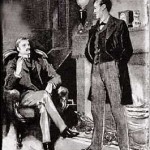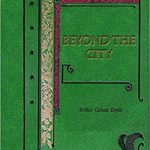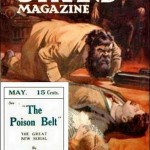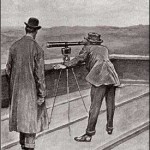It chanced that on the afternoon of which we speak the major was engrossed by this very subject. Standing at the head of the broad stone steps which lead up to the palatial edifice which its occupiers irreverently term the Rag and Bobtail, he was explaining to a bull-necked, olive-complexioned young man the series of marriages and inter-marriages which had culminated in the production of his own portly, stiff-backed figure. His companion, who was none other than Ezra Girdlestone, of the great African firm of that name, leaned against one of the pillars of the portico and listened gloomily to the major’s family reminiscences, giving an occasional yawn which he made no attempt to conceal.
“It’s as plain as the fingers of me hand,” the old soldier said in a wheezy muffled brogue, as if he were speaking from under a feather-bed. “See here now, Girdlestone—this is Miss Letitia Snackles of Snackleton, a cousin of old Sir Joseph.” The major tapped his thumb with the silver head of his walking-stick to represent the maiden Snackles. “She marries Crawford, of the Blues—one o’ the Warwickshire Crawfords; that’s him”—here he elevated his stubby forefinger; “and here’s their three children, Jemima, Harold, and John.” Up went three other fingers. “Jemima Crawford grows up, and then Charley Clutterbuck runs away with her. This other thumb o’ mine will stand for that young divil Charley, and then me fingers—”
“Oh, hang your fingers,” Girdlestone exclaimed with emphasis. “It’s very interesting, major, but it would be more intelligible if you wrote it out.”
“And so I shall, me boy!” the major cried enthusiastically, by no means abashed at the sudden interruption. “I’ll draw it up on a bit o’ foolscap paper. Let’s see; Fenchurch Street, eh? Address to the offices, of course. Though, for that matter, ‘Girdlestone, London,’ would foind you. I was spakin’ of ye to Sir Musgrave Moore, of the Rifles, the other day, and he knew you at once. ‘Girdlestone?’ says he. ‘The same,’ says I. ‘A merchant prince?’ says he. ‘The same,’ says I. ‘I’d be proud to meet him,’ says he. ‘And you shall,’ says I. He’s the best blood of county Waterford.”
“More blood than money, I suppose,” the young man said, smoothing out his crisp black moustache.
“Bedad, you’ve about hit it there. He went to California, and came back with five and twinty thousand pounds. I met him in Liverpool the day he arrived. ‘This is no good to me, Toby,’ says he. ‘Why not?’ I asks. ‘Not enough,’ says he; ‘just enough to unsettle me.’ ‘What then?’ says I. ‘Put it on the favourite for the St. Leger,’ says he. And he did too, every pinny of it, and the horse was beat on the post by a short head. He dropped the lot in one day. A fact, sir, ‘pon me honour! Came to me next day. ‘Nothing left!’ says he. ‘Nothing?’ says I. ‘Only one thing,’ says he. ‘Suicide?’ says I. ‘Marriage,’ says he. Within a month he was married to the second Miss Shuttleworth, who had five thou. in her own right, and five more when Lord Dungeness turns up his toes.”
“Indeed?” said his companion languidly.
“Fact, ‘pon me honour! By the way—ah, here comes Lord Henry Richardson. How d’ye do, Richardson, how d’ye do? Ged, I remember Richardson when he was a tow-headed boy at Clongowes, and I used to lam him with a bootjack for his cheek. Ah, yes; I was going to say—it seems a demned awkward incident—ha! ha!—ridiculous, but annoying, you know. The fact is, me boy, coming away in a hurry from me little place, I left me purse on the drawers in the bedroom, and here’s Jorrocks up in the billiard-room afther challenging me to play for a tenner—but I won’t without having the money in me pocket. Tobias Clutterbuck may be poor, me dear friend, but”—and here he puffed out his chest and tapped on it with his round, sponge-like fist—”he’s honest, and pays debts of honour on the nail. No, sir, there’s no one can say a word against Tobias, except that he’s a half-pay old fool with more heart than brains. However,” he added, suddenly dropping the sentimental and coming back to the practical, “if you, me dear boy, can obloige me with the money until to-morrow morning, I’ll play Jorrocks with pleasure. There’s not many men that I’d ask such a favour of, and even from you I’d never accept anything more than a mere timporary convanience.”
“You may stake your life on that,” Ezra Girdlestone said with a sneer, looking sullenly down and tracing figures with the end of his stick on the stone steps. “You’ll never get the chance. I make it a rule never to lend any one money, either for short or long periods.”
“And you won’t let me have this throifling accommodation?”
“No,” the young man said decisively.
For a moment the major’s brick-coloured, weather-beaten face assumed an even darker tint, and his small dark eyes looked out angrily from under his shaggy brows at his youthful companion. He managed to suppress the threatened explosion, however, and burst into a loud roar of laughter.
“‘Pon me sowl!” he wheezed, poking the young man in the ribs with his stick, an implement which he had grasped a moment before as though he meditated putting it to a less pacific use, “you young divils of business-men are too much for poor old Tobias. Ged, sir, to think of being stuck in the mud for the want of a paltry tenner! Tommy Heathcote will laugh when he hears of it. You know Tommy of the 81st? He gave me good advice: ‘Always sew a fifty-pound note into the lining of each waistcoat you’ve got. Then you can’t go short.’ Tried it once, and, be George! if me demned man-servant didn’t stale that very waistcoat and sell it for six and sixpence. You’re not going, are you?”
“Yes; I’m due in the City. The governor leaves at four. Good-bye.
Shall I see you to-night?”





